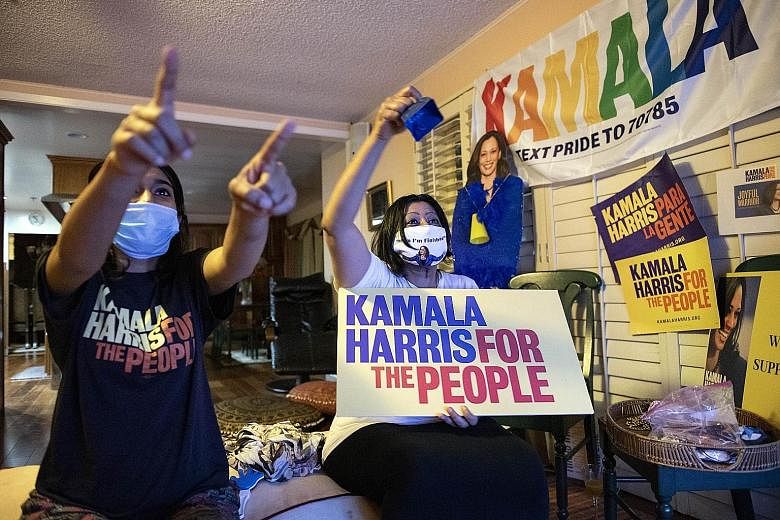This year, the number of Asian American eligible voters will hit a new high of more than 11 million.
Historically, voter turnout among Asian Americans has been tepid. In 2016, more than 64 per cent of white Americans turned out to vote, compared with just 49 per cent of eligible Asian Americans.
But this year, many Asian Americans are hoping that a new enthusiasm for political engagement will translate growing numbers into actual political clout.
"It is incumbent on each and every one of us to vote," Indian American Praveen Vajpeyi, 57, a New York-based creative director, told The Straits Times.
"We can't sit this one out. And people feel a deep need to engage."
The sentiment seems widespread.
"Enthusiasm levels are high," AAPI Data, a publisher of demographic data and policy research on Asian Americans and Pacific Islanders, concluded from its just-released 2020 Asian American Voter Survey.
The survey, based on a national sample of 1,569 Asian American registered voters, was conducted from July 4 to Sept 10. It covered Chinese, Indian, Korean, Vietnamese, Japanese and Filipino voters and was offered in English, Chinese, Korean and Vietnamese.
Over half - 54 per cent - of registered Asian Americans said that compared with previous elections, they are more enthusiastic than usual about voting, AAPI said.
DEMOCRAT-LEANING
A majority (54 per cent) planned to vote for Democratic candidate Joe Biden, compared with 30 per cent who planned to support Republican President Donald Trump.
-
SURVEY ON U.S. PRESIDENTIAL ELECTION IN NOVEMBER
-
54%
Asian American registered voters who said they plan to vote for Democratic candidate Joe Biden.
-
30%
Those who plan to vote for Republican President Donald Trump.
Mr Biden was strongly favoured among all national origin groups, except Vietnamese Americans.
Indian Americans are more likely to identify as Democratic, at 50 per cent, while Vietnamese Americans are more likely to identify as Republican, at 42 per cent.
And 14 per cent of Asian American registered voters remained undecided, with Chinese Americans the highest - 22 per cent - in that category.
NEW GENERATION
The naturalisation of citizens approximately doubled between 2000 and 2018.
Second-and third-generation Indian immigrants are less invested than their parents in their old countries and are growing up as Americans.
The increase in engagement comes partly from people who have grown up in the United States in the past 20 to 30 years, whose parents were immigrants, and who are now more integrated and involved in American society, said Mr Andrew Shiue, 44, a Taiwanese-American law professional in New York.
In an interview, Mr Shiue mentioned the candidacy of Mr Andrew Yang as an inflection point.
Mr Yang could have been a contender.
The California-based millionaire entrepreneur's bid for the Democratic Party's ticket did not survive the primaries, but even though some Asian Americans cringed at his "The opposite of Donald Trump is an Asian man who likes math" shtick, he made an impression.
"By leaning into the stereotype, Yang effectively said: Remind me - why should I be on the defensive about this," wrote Mr Wesley Yang, author of the book The Souls Of Yellow Folk, last October in The Washington Post, when Mr Yang's campaign was still active.
He had "gone from being a novelty candidate to providing a glimpse at a future when Asian Americans become universal figures in American political life, and realise their potential not just to serve but to lead", the author wrote.
NEGLECTED BY PARTIES
The majority of Asian Americans have not been contacted by either major party this cycle, however.
"Political parties have yet to harness the power of the Asian American vote despite the fact that many remain persuadable," the AAPI survey concluded.
"The 2020 Asian American Voter Survey shows that about half of all respondents were not contacted by either major party. With a higher than average response of voters who do not subscribe with either party, party outreach will be critical for Asian American voters."
Asian Americans are as diverse a group as Asians, of course.
And while they generally lean Democratic, the business community tends to be conservative and favours low taxes.
But in general, most will vote based on issues, of which there are three big ones: racial discrimination, the economic crisis that is not being addressed due to the coronavirus pandemic, and immigration.
ENOUGH, SAYS THE HOUSE
Separately on Thursday, Asian Americans received good news on the first issue. The House, in a 243-164 vote, passed a resolution condemning "all forms of anti-Asian sentiment as related to Covid-19".
The measure came after a rise in recent months of racial harassment, mainly of Chinese Americans, particularly on the back of President Trump blaming China - though the Trump administration tries to separate the Chinese government from the Chinese people - for the pandemic.
Representative Grace Meng, a Democratic congresswoman from New York, the main sponsor of the resolution, said the vote showed that "the House said 'Enough' ".
"For months, Asian Americans in my home state of New York and in communities throughout the nation have been verbally and physically attacked, spat on and shunned," she said.
"Enough of the demeaning usages of 'Chinese virus', 'Wuhan virus' and 'Kung-flu', especially from our nation's leaders such as President Trump," she said.
"Enough of the scapegoating."


